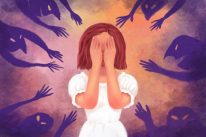“Instead of complaining that the rose bush is full of thorns, be happy the thorn bush has roses.” ~Proverb
I am a member of a mercifully small subset of society. I am the mother of a dead child.
Twenty years ago, my daughter Grace—my first child, my only girl—was born prematurely and died 32-minutes later. As I write this, I am astonished that it has been twenty years since I met my daughter for the only time.
Time stopped for me when Grace took her last little breath. And I was certain that my life could never start again.
I was wrong.
Here’s what made all the difference in my healing:
Over time, I learned to bless the thorns in my life. I began to see that the thorn and rose define one another. Since, one cannot exist without the other, we can only enjoy the rose when we embrace the thorn.
As a society, though, we make healing from loss very difficult. We unintentionally tell each other lies about suffering and the healing process.
One of those lies is that “Time heals all wounds.”
If time healed all wounds, why do so many people suffer their entire lives from things that happened decades ago?
As one of the bereavement experts I studied explained, it’s not “time” that heals all wounds. It’s hard work. And hard work takes time.
Here is some of the hard work of healing:
Choose to Heal
When great tragedy comes to your life, you have just one decision to make that will determine the whole of your remaining life:
Will you be bitter or better?
Your future happiness depends on the choice you make.
On the surface of it, this seems like a “no brainer” decision. I mean, why would you choose bitterness over joy?
Well, here’s one reason: When a child dies, your entire future dies—at least the future you envisioned for yourself. When that child is an infant, you believe your sorrow is the only tangible evidence of her brief life.
The choice to get better means making the choice to move past your sorrow.
As strange as it sounds, the loss of your sorrow can feel like an additional death. Worse, it feels like the final death, because it feels like you are choosing to deny your child’s entire existence.
(As it turns out, I was wrong about that. Lots of other tangible evidence came from Grace’s life—this piece, for example.) But those roses bloom at some future point, while your suffering is immediate.
Let no one say that healers lack courage.
Choosing to heal means letting go of the immediate reward of your suffering for the possible promise of future insight.
It is a risk that all who heal take, and it is not an easy choice to make while you are in the hell of acute loss.
I urge you to make it nonetheless.
The Thorns Make Community Possible
Joy can be an individual experience. When you are joyful, I am happy for you. But I don’t necessarily feel enlightened by your happiness. When you let me see your sorrow, however, then I feel an affinity with you.
It is our shared suffering—our thorns—that make empathy possible.
It is our thorns that make us protective of one another. In this way, thorns are the pathway to community and peace.
Suffering Brings Wisdom—If You Choose to Heal
It used to bother me that people complimented me for my “wisdom” or “courage” after Grace died. Somehow, it felt like the Spiritual Booby Prize. To this day, I would trade that wisdom for the return of my daughter. But I don’t have that choice.
If I refuse to celebrate and share that hard-won wisdom, I essentially cut the rose from the thorn bush.
In my case, Grace would have been the rose I would have preferred. But that rose is not available to me. The rose of wisdom is.
I share that wisdom because it is a gift of grace. My Grace. The rose of my wisdom is made possible because of the thorn of my sorrow. Grace’s legacy is manifested when I share the wisdom she left me.
You Sorrow Makes You Free
Once the “worst thing” that can ever happen to you in life actually happens—once you decide to get better instead of bitter—then you get to live the entire rest of your life without feeling paralyzed by fear. After all what is left to fear?
But what if the worst thing hasn’t happened to you yet? Can you still live a life less controlled by fear?
Absolutely!
Here’s how: Remember that suffering makes community possible. That means that you can “borrow” my suffering and use it as a balm to heal your fears.
In my case, the suffering and death of a child would be the “worst thing” that could happen in life. What is your “worst thing”?
Whatever that thing is, I can assure you that some human being in the history of the planet has survived that thing.
And triumphed!
All you have to do to be break free from fear is determine that, if your “worst thing” ever happened, you would make a study of how others have triumphed over that thing.
Once you make that decision, you have a “worst case scenario” action plan in place. You are now free to live life without feeling weighed down by fear.
If you decide.
To get better.
Instead of bitter.
The tools of choice, celebration, community, and study are ways that I have learned to become a better mother to my daughter, Grace. Twenty years later, I see these to be the tangible manifestation of her 32-minute life.
The thorn of my loss illuminates the resplendent rose of Grace’s legacy—the message that “all healing is possible,” for myself and others.
Photo by Hamed Saber
About Jennifer Boykin
Jennifer Boykin helps women recapture their Mid-Life Mojo. She speaks and writes as the Creative Visionary and Chief Rabble-Rouser of the MidLife Reinvention site, Life After Tampons. As of TODAY, Jennifer has launched registration her first small-group workshop, Craft Your Comeback. Learn more HERE.














 Though I run this site, it is not mine. It's ours. It's not about me. It's about us. Your stories and your wisdom are just as meaningful as mine.
Though I run this site, it is not mine. It's ours. It's not about me. It's about us. Your stories and your wisdom are just as meaningful as mine. 